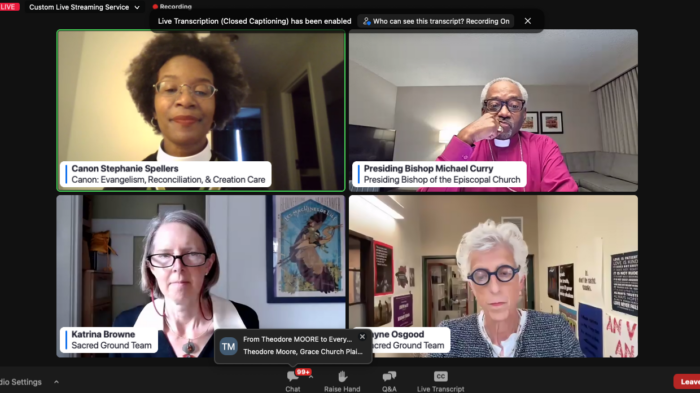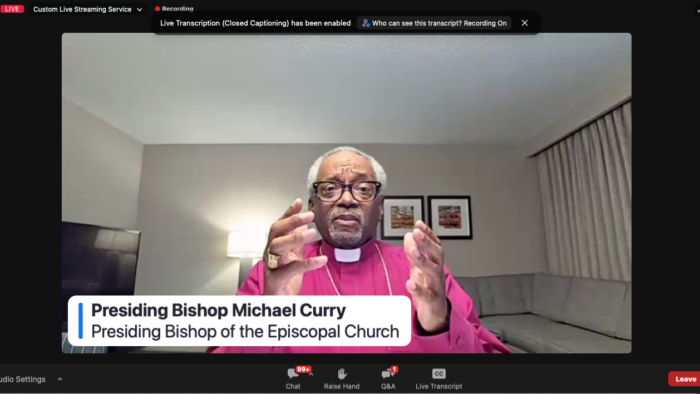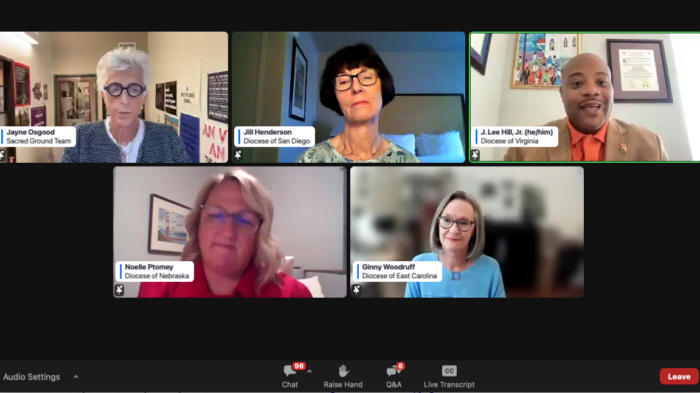Church lauds success of Sacred Ground curriculum as new groups form to study history of racismPosted Sep 15, 2022 |
|
[Episcopal News Service] The Episcopal Church’s Sacred Ground curriculum, developed and launched in February 2019, has been a resounding success as measured by the widespread adoption of the curriculum as part of the church’s efforts to promote racial reconciliation and healing. Over 2,300 small discussion groups, or “circles,” have registered so far to facilitate the 10-part, film-based discussion series, and more are getting underway this fall.
On Sept. 15, participants in some of those Sacred Grounds circles and other Episcopalians interested in starting their own circles attended a webinar kicking off the latest round of Sacred Ground discussions. Over 1,300 people attended the webinar, underscoring the curriculum’s continued relevance and broad resonance across the church.

The Episcopal Church held a webinar on Sept. 15 to highlight the success of Sacred Ground, a curriculum for small group discussions about the history of racism in the United States.
Presiding Bishop Michael Curry, in his opening remarks, called himself a “cheerleader for Sacred Ground” and said he is encouraged by the way Episcopalians bring up Sacred Ground to him everywhere he travels. “I can’t think of anything quite like this, that’s impacting the church and people in the church,” Curry said. “It’s just utterly remarkable, and I thank God for it and thank God for you.”
The church developed the curriculum as a resource primarily for white Episcopalians to learn about the history of racism in the United States and the way racism continues to manifest itself today in American social interactions and institutions, including churches, even when the people involved are not themselves racist. The church also welcomes people of color to participate in Sacred Ground circles, but it cautions that they shouldn’t feel obligated to explain the experience of racism to their white neighbors.
“Sacred Ground has provided an accessible way for us to engage difficult conversations about race and, by implication and logic, about a whole host of our human relationships and structural relationships that are hard to talk about,” Curry said.

Presiding Bishop Michael Curry gives opening remarks for the Sept. 15 webinar on Sacred Ground.
The Sept. 15 webinar also included panel discussions with Episcopal leaders who shared their stories of helping to facilitate Sacred Ground circles. Ginny Woodruff, a lay leader in the Diocese of East Carolina, identified reluctance from some people in her diocese that the discussion of racism would veer into partisan politics. Those who participated were reassured.
“It’s about education, not politics,” Woodruff said. “Partisan politics had no place in this conversation. Certainly, everything in our world is politicized these days, but we can steer it away from partisan politics. This is about our true history that most of us have not known. This is about hearing the other side.”
Sacred Ground is built around an online curriculum of documentary films and readings that focus on Indigenous, Black, Latino, and Asian/Pacific American histories as they intersect with European American histories. Participants also examine examples of systemic racism in today’s America, such as mass incarceration and its disproportionate effect on people of color.
Though launched in 2019, churchwide participation accelerated dramatically after the May 2020 killing of George Floyd, as racial justice issues moved to the forefront of public discourse. The surge in online meetings early in the pandemic also created opportunities for Sacred Ground circles to gather more conveniently online.
Some congregations formed Sacred Ground circles for their own interested members. Other circles have been organized at the diocesan level, often as part of broader efforts to participate in Becoming Beloved Community, The Episcopal Church’s cornerstone racial reconciliation initiative.
In November 2021, clergy in Brunswick, Georgia, started two Sacred Ground circles to learn and talk about racism amid lingering tension in their community over the February 2020 killing of Black jogger Ahmaud Arbery by three white vigilantes. And last February, a group of eight Episcopal bishops embarked on a pilgrimage to civil rights landmarks in Alabama following the bishops’ Sacred Ground sessions.
The church continues to emphasize Sacred Ground as a key resource of Becoming Beloved Community, the framework that the church launched in 2017 to help guide congregations and dioceses in engaging with race as a spiritual and social issue. Becoming Beloved Community, invoking a term popularized by the Rev. Martin Luther King Jr., has four parts: telling the truth about the church and race; proclaiming the dream of Beloved Community; practicing the way of love in the pattern of Jesus; and repairing the breach in society, such as through advocacy for reform.
Sacred Ground isn’t intended as a comprehensive history of racism, but rather a starting point for discussion as participants connect historical narratives with their own life experiences. Unlike other anti-racism programs, it doesn’t require an experienced trainer, only volunteer facilitators. Participants prepare themselves before meeting by viewing one or more videos and completing reading assignments, including the curriculum’s two core books: “Waking Up White,” a 2014 memoir by Debby Irving, and “Jesus and the Disinherited” by Black theologian Howard Thurman, originally published in 1949.
“I strongly believe that education is the key to eliminating racism and then pursuing racial justice,” said Lesley Dean, a lay leader who has helped coordinate the Diocese of Nebraska’s growing effort to get its congregations involved in Sacred Ground.
And though the curriculum doesn’t prescribe specific real-world responses, it presumes participants will be moved to work for social change in their own ways when they are done.
“These small groups can also become accountability spaces where we challenge each other, and where we eventually move into action and do things together that I could not have done on my own,” the Rev. Stephanie Spellers, the presiding bishop’s canon for evangelism, reconciliation and creation care, said during the webinar.

Panelists discuss The Episcopal Church’s Sacred Ground curriculum during a Sept. 15 webinar to kick off the fall round of new Sacred Ground circles.
In the Diocese of San Diego, over 650 people have participated in Sacred Ground across 16 parishes, according to Jill Henderson, who has led some of those efforts. The diocese also is testing out an expansion of the curriculum beyond the original 10 sessions, with additional materials to give participants guidance on how to put what they’ve learned into practice.
“I think you have to give people opportunities to act,” Henderson said. “You have to really move people into action.”
The Rev. J. Lee Hill Jr., the Diocese of Virginia’s missioner for racial justice and healing, said Sacred Ground participants who are considering what to do next might volunteer to facilitate the next Sacred Ground circle in their congregations or communities. Sharing what they’ve learned is a way of taking action.
“It becomes this work of opening new space of creating new opportunities for folks to engage in a different kind of way,” Hill said. “You don’t have to be an expert, but you just have to be a guide and wiling to walk alongside one another in the journey.”
– David Paulsen is an editor and reporter for Episcopal News Service. He can be reached at dpaulsen@episcopalchurch.org.

Social Menu